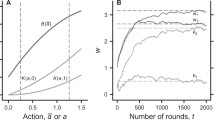Abstract
This paper studies a novel game-theoretic setting: players may acquire new actions over time by observing the opponent’s play. We model this scenario as finitely repeated games where players’ action sets are private information and may endogenously expand over time. Three main implications emerge from this framework and its equilibria. First, players may target a payoff vector for the long run and voluntarily “teach” one another the actions needed in early periods. The action profile will be learned and sustained as long as each action is available to either player. Second, when no payoff target is prefixed, the players can always obtain or approximate strict ex-post efficiency via bilateral teaching and learning. Third, an alternative economic argument now exists for seemingly irrational cooperative behavior in games with finite horizon. For instance, fully rational players can play a cooperative equilibrium even if the stage game remains a Prisoner’s Dilemma for everyone.
Similar content being viewed by others
References
Andreoni, J.: Why free ride? Strategies and learning in public goods experiments. J. Public Econ. 37(3), 291–304 (1988)
Andreoni, J., Miller, J.H.: Rational cooperation in the finitely repeated prisoner’s dilemma: experimental evidence. Econ. J. 103(418), 570–585 (1993)
Benoit, J.-P., Krishna, V.: Finitely repeated games. Econometrica 53(4), 905–922 (1985)
Bhaskar, V., van Damme, E.: Private strategies in finitely repeated games with imperfect public monitoring. J. Econ. Theory 102(1), 16–39 (2002)
Bos, I., Marini, M.A.: Collusion in quality-segmented markets. J. Public Econ. Theory 24(2), 293–323 (2022)
Camerer, C.F., Ho, T.-H., Chong, J.-K.: Sophisticated experience-weighted attraction learning and strategic teaching in repeated games. J. Econ. Theory 104(1), 137–188 (2002)
Chandrasekhar, A.G., Xandri, J.P.: A note on payments in the lab for infinite horizon dynamic games with discounting. Econ. Theor. 75, 389–426 (2023)
Chassang, S.: Building routines: Learning, cooperation, and the dynamics of incomplete relational contracts. Am. Econ. Rev. 100(1), 448–465 (2010)
Crawford, V.P., Haller, H.: Learning how to cooperate: optimal play in repeated coordination games. Econometrica 58(3), 571–595 (1990)
Cressman, R.: Evolutionary stability in the finitely repeated prisoner ’s dilemma game. J. Econ. Theory 68(1), 234–248 (1996)
Dutta, P.K.: A folk theorem for stochastic games. J. Econ. Theory 66(1), 1–32 (1995)
Fudenberg, D., Maskin, E.: The folk theorem in repeated games with discounting or with incomplete information. Econometrica 54(3), 533–554 (1986)
Fudenberg, D., Yamamoto, Y.: The folk theorem for irreducible stochastic games with imperfect public monitoring. J. Econ. Theory 146(4), 1664–1683 (2011)
Joosten, R., Peters, H., Thuijsman, F.: Unlearning by not doing: repeated games with vanishing actions. Games Econom. Behav. 9(1), 1–7 (1995)
Kreps, D.M., Wilson, R.: Reputation and imperfect information. J. Econ. Theory 27(2), 253–279 (1982)
Kreps, D.M., Milgrom, P., Roberts, J., Wilson, R.: Rational cooperation in the finitely repeated prisoners’ dilemma. J. Econ. Theory 27(2), 245–252 (1982)
Mailath, G.J., Matthews, S.A., Sekiguchi, T.: Private strategies in finitely repeated games with imperfect public monitoring. B.E. J. Theor. Econ. 2(1), 1–23 (2002)
Marlats, C.: A folk theorem for stochastic games with finite horizon. Econ. Theor. 58(3), 485–507 (2015)
Milgrom, P., Roberts, J.: Predation, reputation, and entry deterrence. J. Econ. Theory 27(2), 280–312 (1982)
Miyahara, Y., Sekiguchi, T.: Finitely repeated games with monitoring options. J. Econ. Theory 148(5), 1929–1952 (2013)
Mookherjee, D., Sopher, B.: Learning behavior in an experimental matching pennies game. Games Econom. Behav. 7(1), 62–91 (1994)
Muller, L., Sefton, M., Steinberg, R., Vesterlund, L.: Strategic behavior and learning in repeated voluntary contribution experiments. J. Econ. Behav. Organ. 67(3–4), 782–793 (2008)
Nachbar, J.H.: Evolution in the finitely repeated prisoner’s dilemma. J. Econ. Behav. Organ. 19(3), 307–326 (1992)
Nagel, R.: Unraveling in guessing games: an experimental study. Am. Econ. Rev. 85(5), 1313–1326 (1995)
Selten, R., Stoecker, R.: End behavior in sequences of finite prisoner’s dilemma supergames: a learning theory approach. J. Econ. Behav. Organ. 7(1), 47–70 (1986)
Weinstein, J., Yildiz, M.: Reputation without commitment in finitely repeated games. Theor. Econ. 11(1), 157–185 (2016)
Author information
Authors and Affiliations
Corresponding author
Additional information
Publisher's Note
Springer Nature remains neutral with regard to jurisdictional claims in published maps and institutional affiliations.
We are grateful to Ichiro Obara, Moritz Meyer-ter-Vehn, Yi Chen, Peter Norman, Fei Li, Xi Weng, Jie Zheng and the seminar audience at the Hong Kong University of Science and Technology, the City University of Hong Kong, and Peking University for helpful suggestions. Yangbo Song gratefully acknowledges financial support from Natural Science Foundation of China (NSFC), Project Number 72192805. Mofei Zhao gratefully acknowledges financial support from Natural Science Foundation of China (NSFC), Project Number 72103016.
Rights and permissions
Springer Nature or its licensor (e.g. a society or other partner) holds exclusive rights to this article under a publishing agreement with the author(s) or other rightsholder(s); author self-archiving of the accepted manuscript version of this article is solely governed by the terms of such publishing agreement and applicable law.
About this article
Cite this article
Song, Y., Zhao, M. Cooperative teaching and learning of actions. Econ Theory 76, 1289–1327 (2023). https://doi.org/10.1007/s00199-023-01497-x
Received:
Accepted:
Published:
Issue Date:
DOI: https://doi.org/10.1007/s00199-023-01497-x




